Related Research Articles
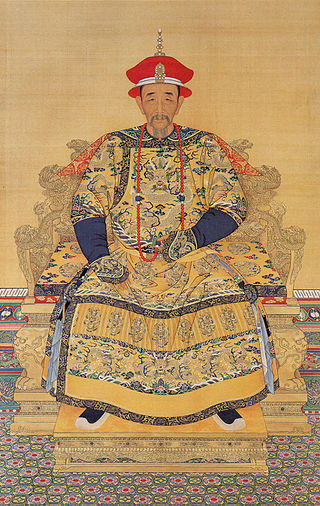
The Kangxi Emperor, also known by his temple name Emperor Shengzu of Qing, personal name Xuanye, was the fourth emperor of the Qing dynasty, and the second Qing emperor to rule over China proper. His reign of 61 years makes him the longest-reigning emperor in Chinese history and one of the longest-reigning rulers in history. He is considered one of China's greatest emperors.
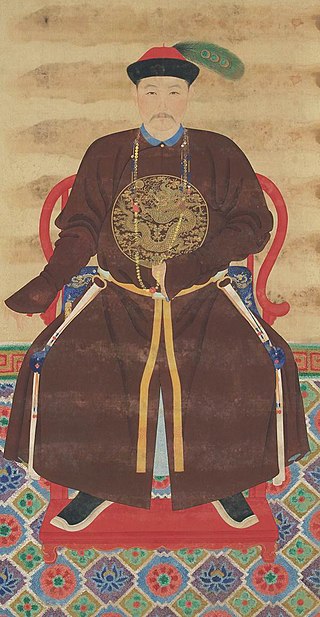
Yunsi, born as Yinsi, was a Manchu prince of the Qing dynasty in China. The eighth son of the Kangxi Emperor, Yunsi was a pivotal figure in the power struggle over the succession to his father's throne. Yunsi was believed to be favoured by most officials in the imperial court to be the next emperor but ultimately lost the struggle to his fourth brother Yinzhen, who became the Yongzheng Emperor.

Ebilun was a Manchu noble and warrior of the Niohuru clan, most famous for being one of the Four Regents assisting the young Kangxi Emperor from 1661 to 1667, during the early Qing dynasty (1644–1912). A largely passive figure during the regency, Ebilun was disgraced following the ouster of the far more powerful regent Oboi and considered a political supporter of the latter. He was stripped of his positions by the emperor but later regained his noble rank. Many of his descendants became influential figures in the Qing imperial government.

Yinxiang, formally known as Prince Yi, was a Manchu prince of the Qing dynasty. The thirteenth son of the Kangxi Emperor, Yinxiang was a major ally of his brother Yinzhen during the latter's struggle for the succession of the throne. He was made a qinwang during Yongzheng's reign and became one of his closest advisors. He died eight years into the reign of the Yongzheng Emperor and was memorialized with top honours by the emperor. When he died, his title was granted "iron-cap" status and became perpetually inheritable, one of the only twelve such princes in Qing dynasty history.
Songgotu was a minister during the reign of the Kangxi Emperor of the Qing dynasty. He was an uncle of the emperor's primary spouse, Empress Xiaochengren of the Hešeri clan, who died during childbirth. He was also the son of Sonin, one of the four regents appointed to assist the young Kangxi Emperor during his minority. As Empress Xiaochengren's paternal uncle, he was also therefore, the grand-uncle of Yinreng, who was crown prince throughout most of the Kangxi Emperor's reign. Songgotu did not inherit the noble title First-class Duke or First-class Earl from his father Sonin because his mother was not the primary consort, therefore, he had the lowest status of his brothers. His sixth brother and fifth brother inherited the noble titles First-class Duke and First-class Count. His oldest brother, Gabula, was Empress Xiaochengren's father, and he also had the noble title First-class Duke.
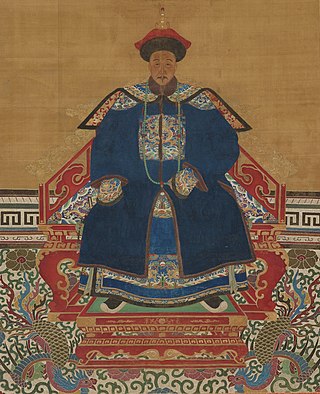
Yinzhi, also known as Yunzhi, was a Manchu prince of the Qing Dynasty.

Heshen (Manchu: ᡥᡝᡧᡝᠨ, Möllendorff: Hešen; Chinese: 和珅; pinyin: Héshēn; Wade–Giles: Ho2-shen1; 1 July 1750 – 22 February 1799) of the Manchu Niohuru clan, was an official of the Qing dynasty favored by the Qianlong Emperor and called the most corrupt official in Chinese history. After the death of Qianlong, the Jiaqing Emperor confiscated Heshen's wealth and forced him to commit suicide. As an official, he acquired an estimated at 1.1 billion taels of silver, equal to roughly US$270 billion. Heshen is remembered as one of the richest men in history.
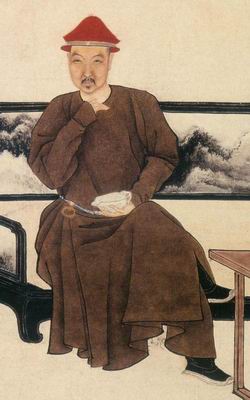
Nalan Xingde, Manchu name Nara Singde, courtesy name Rongruo (容若), was a Chinese poet in Qing dynasty, famous for his ci poetry. He was born Nalan Chengde (納蘭成德), but had to change his name when the Kangxi Emperor named Yunreng his crown prince. The character cheng (成) became taboo because it was phonetic part of Yunreng's birth name.
Longkodo was a Manchu court official who lived in the Qing dynasty. He was from the Tunggiya clan, which was under the Bordered Yellow Banner. His period of fame lasted from the late Kangxi era to the early Yongzheng era, perhaps most famous for delivering the Kangxi Emperor's disputed will.
Tulišen was a Manchu official and diplomat during the early Qing dynasty.
Yinzhi, also known as Yunzhi, formally known as Prince Zhi of the Second Rank between 1698 and 1708, was a Manchu prince of the Qing dynasty.
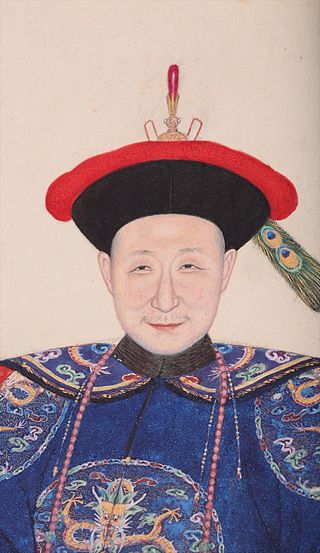
Fuk'anggan, courtesy name Yaolin, was a Manchu noble and general of the Qing Dynasty. He was from the Fuca clan and the Bordered Yellow Banner of the Eight Banners.
Jirgalang or Jirhalang was a Manchu noble, regent, and political and military leader of the early Qing dynasty. Born in the Aisin Gioro clan, he was the sixth son of Šurhaci, a younger brother of Nurhaci, the founder of the Qing dynasty. From 1638 to 1643, he took part in many military campaigns that helped destroy the Ming dynasty. After the death of Huangtaiji in September 1643, Jirgalang became one of the young Shunzhi Emperor's two co-regents, but he soon yielded most political power to co-regent Dorgon in October 1644. Dorgon eventually purged him of his regent title in 1647. After Dorgon died in 1650, Jirgalang led an effort to clean the government of Dorgon's supporters. Jirgalang was one of ten "princes of the first rank" (和碩親王) whose descendants were made "iron-cap" princes (鐵帽子王), who had the right to transmit their princely titles to their direct male descendants perpetually.

Nurhaci, also known by his temple name as the Emperor Taizu of Qing, was the founding khan of the Jurchen-led Later Jin dynasty.
Fuquan (Manchu: ᡶᡠᠴᡳᠣᠸᠠᠨ, Möllendorff: fuciowan, Abkai: fuqiuwan, formally known as Prince Yu, was a Manchu prince of the Qing dynasty. He was the second son of the Shunzhi Emperor and a half-brother of the Kangxi Emperor.
Maci (1652–1739) was a Manchu Bordered Yellow Banner court official who lived in the Qing dynasty. He was from the Fuca clan, and was the eldest son of Mishan (米思翰).
Tong Guogang was a Qing dynasty official. He was a maternal uncle of Kangxi Emperor.
Tong Guowei was a Qing dynasty official. He was a maternal uncle of Kangxi Emperor.
Xuyuanmeng (1655–1741), courtesy name Shanchang (善長), art name Dieyuan (蝶園), was a Qing dynasty official from the Manchu Šumuru clan and the Plain White Banner of the Eight Banners.
Necin, born in Niohuru clan, was a Qing dynasty official from the Manchu Plain Yellow Banner.
References
- ↑ Hummel, Arthur W. Sr., ed. (1943). . Eminent Chinese of the Ch'ing Period . United States Government Printing Office. p. 577.
- ↑ Hummel, Arthur W. Sr., ed. (1943). . Eminent Chinese of the Ch'ing Period. United States Government Printing Office.
- ↑ Wu-chi Liu; Irving Yucheng Lo (1975). Sunflower splendor: three thousand years of Chinese poetry. Indiana University Press. p. 612. ISBN 978-0-253-35580-5 . Retrieved 29 April 2019.